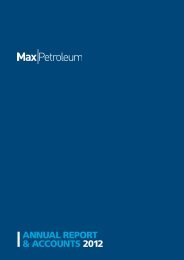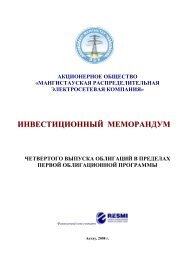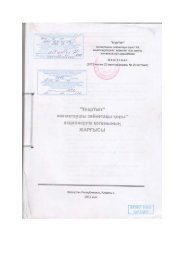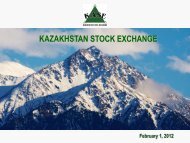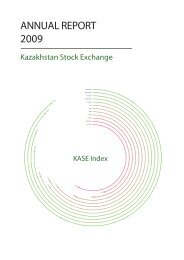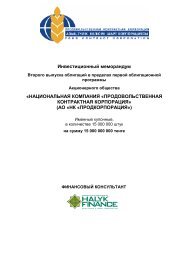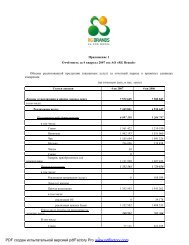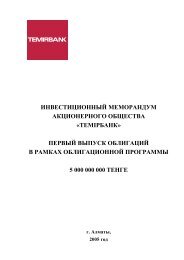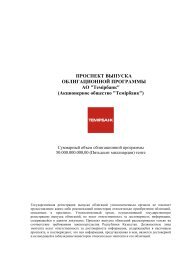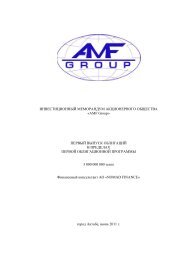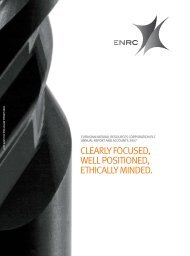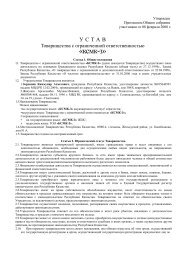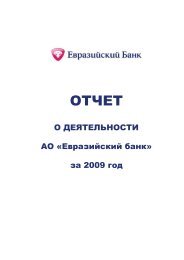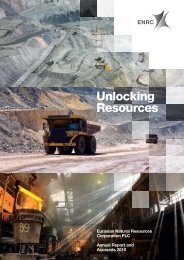JPMorgan - KASE
JPMorgan - KASE
JPMorgan - KASE
Create successful ePaper yourself
Turn your PDF publications into a flip-book with our unique Google optimized e-Paper software.
has increased to 24,000 BOPD in the third quarter of 2002 compared to 18,400 BOPD in the<br />
second quarter of 2002, a 30% increase. Current production is averaging 28,500 BOPD.<br />
Additional production testing continues in the QAM fields. The combined production rate for all<br />
three fields increased 44% to 15,900 BOPD in the third quarter of 2002 compared to 11,000 BOPD<br />
in the second quarter. This production is delivered from 23 wells. The QAM field's year-to-date<br />
average production is 11,700 BOPD.<br />
The program of further development and production enhancement of the Akshabulak field,<br />
operated by Kazgermunai, required the installation of a new process facility in 2002. The<br />
purchase order for this new facility is being delayed by our joint venture partners, pending<br />
assurances from the government of Kazakhstan on marketing and transportation issues.<br />
However, we operate in a regulated environment and from time to time, governmental action<br />
can impact, among other things, our level of production.<br />
The 38-well 2002 drilling program of the Turgai Petroleum joint venture has been completed. An<br />
additional 17 wells were added to the 2002 drilling program. Gross production increased by 20%<br />
to 49,800 BOPD in the third quarter of 2002 compared to 41,400 BOPD in the second quarter of<br />
2002.<br />
Overall, in the first nine months of 2002, we participated in the drilling of 50 new wells. An<br />
additional 22 wells were drilled in the fourth quarter of 2002.<br />
Sales. Through the end of the second quarter of 2002, the majority of crude oil export sales were<br />
FCA (freight carriage assurance) sales to third parties within Kazakhstan, normally at the rail<br />
terminal at Tekesu, adjacent to the Shymkent refinery. The price achieved for these export sales<br />
is shown net of a differential to the prevailing Brent price at the time of the sale. The differential<br />
reflects a number of factors, the most significant of which relates to rail transportation costs.<br />
Title to the crude oil passes to the buyer at the point of loading the crude into rail cars. In the<br />
tables below, these sales are shown as “Crude sales sold FCA” (freight carriage assurance).<br />
In addition, beginning in 2001 we made our first direct sale from a Black Sea port (Batumi) on<br />
FOB (free on board) terms. Under these types of sales, we arrange all transportation to the port<br />
and assume the obligations for this transportation. The sale price reflects the Brent price plus or<br />
minus a quality differential to the Black Sea port at the time of sale. With this type of sale, title<br />
to the crude does not pass to the buyer until the crude is loaded into an oil tanker in the<br />
respective Black Sea port. Sales contracts are also being concluded on DAF (delivery at frontier)<br />
terms, where title to the crude oil passes to the buyer at the border, and CIF (cost, insurance and<br />
freight) and CPT (carriage paid to) terms, where title to the crude oil passes at the final<br />
destination. In the tables below, these sales are shown as “Crude sales sold FOB”.<br />
Revenue is recognized at the time title passes. In the case of FCA sales, we record revenue based<br />
on a provisional Brent price at the time of delivery at Tekesu, then mark to market at month end<br />
if the crude is still in Kazakhstan to reflect increases or decreases in prevailing Brent prices, and<br />
adjust if necessary by reference to the bill of lading date based on the contract terms.<br />
In the third quarter, 45% of crude oil export sales represented “Crude sales sold FOB”, including<br />
exports made CIF to Italian refineries, FOB Batumi, FOB Odessa via Atyrau-Samara, CPT<br />
Novorossiisk and DAF China, albeit these Chinese volumes remain relatively small. The remaining<br />
sales were made on an FCA basis.<br />
The FCA differential or, in the case of non-FCA sales, the cost of transportation, represents our<br />
largest operating cost. As we continue to increase non-FCA sales in 2003, we anticipate that<br />
crude oil revenue and transportation costs will increase significantly, even in the event that prices<br />
and volumes remain consistent with prior periods, and we also anticipate significant increases in<br />
working capital requirements.<br />
Crude export sales volumes continued to rise, showing an 11% increase compared to the second<br />
quarter despite the uninterrupted operation of the refinery during the third quarter. Shipments<br />
from the loading station at Tekesu also continued to improve, recording a 10% increase against<br />
the second quarter. The quarter closed with record export shipments averaging 90,179 BOPD<br />
32



